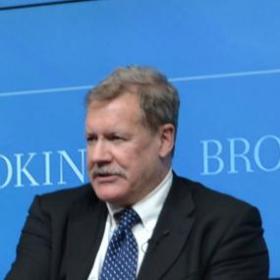
Organized Political Islam: Rising Power
Greg Austin wrote this piece for his weekly column in New Europe
As readers of this newspaper will know, the OSCE spans three continents, brings together about 15 per cent of humanity, has 56 members, and has four out of five permanent seats in the UNSC. There is another regional organization that also spans three continents, represents the aspirations of a bigger slice of humanity (about 25 per cent), and has 57 countries as members, but none with a permanent seat in the UN Security Council.
The group in question is the Organization of Islamic Conference (OIC), the world’s only “regional organization” based around a religious attribution. Apart from its 57 members (Muslim majority states), there are a number of states or entities as observers: Bosnia and Hercegovina, Thailand, Russia, the Central African Republic and the Turkish Cypriot government.
The OIC has its own Development Bank, its Islamic UNESCO (ISESCO), the Islamic International Court, the International Islamic News Agency, and a host of subsidiary and affiliated organizations. It does not of course represent in a direct political sense all Muslims, but it does purport to speak on behalf of the “umma” (the community of Muslim believers worldwide).
Osama bin Laden wrote often of the Umma, expressing on occasion the hope that it would rise again to a prominent place in world political affairs, and be recognized again for high achievement in the arts and sciences. I mention that not to credit the source in any way, but to demonstrate that the sentiment about an organized Islamic resurgence is seen as a good mobilizing tool. That aspiration is shared by many leaders in the Islamic world, and it is captured in the Charter of the OIC: “to work for revitalizing Islam’s pioneering role in the world”. This vision, one I share, is the departure point of this analysis.
There are other high ambitions expressed in the OIC charter, including the more familiar idea of a “common market”, albeit an “Islamic Common Market”. Turkey, also an aspirant for EU membership, is actively promoting both parts of this OIC agenda: scientific and technological advance and regional economic integration.
The OIC revised its original 1972 Charter only in 2008. At the time, Indonesia’s President, Susilo Bambang Yudhoyono, declared that as a result of the new charter "the possibility of an Islamic Renaissance lies before us".
The OIC is a leading force in the fight globally against violent extremism. In 2008, the conference declaration noted: “We continue to strongly condemn all forms of extremism and dogmatism which are incompatible with Islam”. The OIC is also leading a global campaign against rising Islamophobia around the world, a phenomenon documented by independent sources.
To many observers, the OIC is an imperfect organization, to be faulted for its internal divisions, for its hostile attitude to Israel, for what some see as its ingrained anti-semitism, and for its extreme political diversity (from monarchies, dictatorships, and radical regimes to democracies of varying stripe).
That view does not capture the essential dynamism and progressive character of the evolutionary path on which the OIC has been set for number of years. Nor does it speak to the sense of injustice over Palestine that for its part, it carries into many political forums.
A full assessment of the trajectory of this interesting organization would be very useful. One thing is clear. The OIC wants a new partnership with the West, and some countries are beginning to respond to that. The path to regional and wider international power and authority may be long and rocky, but the OIC and its member states have a vision for regional and global economic and scientific development that is definitely beginning to change the world for the better. Let’s work with them.

